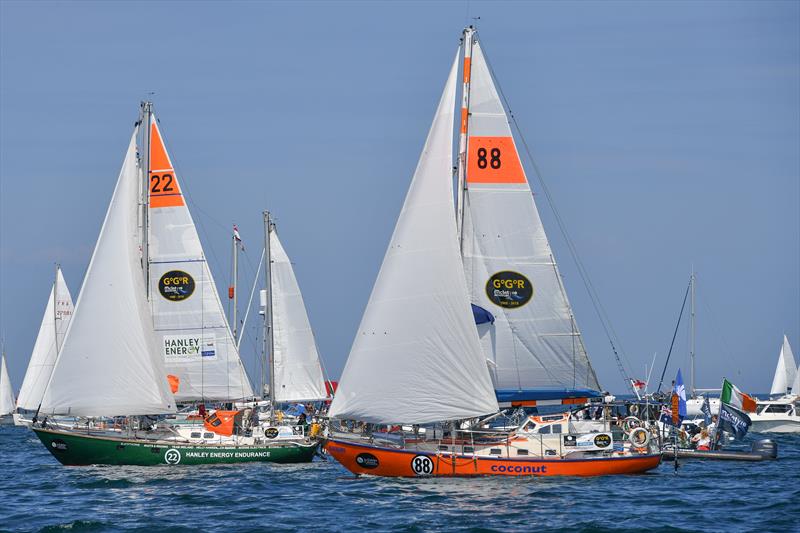
Embracing the adventure and challenge of the Golden Globe Race 2018
by David Schmidt 3 Jul 2018 03:44 AEST
July 2, 2018

Gregor McGuckin (IRE) on his Biscay 36 ketch Hanley Energy Endurance, leads Mark Sinclair (AUS) in his Lello 35 Coconut at the start of the 2018 Golden Globe Race © Christophe Favreau
If you're like me, the romance of adventure can tug powerfully hard at the heart strings, especially when the adventure is one that forces its competitors to dig deep within themselves in order to stagger across the finishing line. The recently concluded Race to Alaska drew in many sailors and nautical adventurers with the gravity of a non-mechanized, "human-powered" race-cum-expedition that took participants up 750 lonely miles of coastline, and it proved (especially in this year's sticky, light airs) that high-quality racecourse engagement isn't a product of pure speed but rather of the human condition.
Which is precisely why the Golden Globe Race 2018, which started yesterday (Sunday, July 1) in Les Sables-d'Olonne, France, and which will take 18 participants all the way around the world (30,000 nautical miles) and then back to Les Sables-d'Olonne, is such a bold "new" take on around-the-world sailing. Sure, the boats might be dog-slow compared to the IMOCA 60 fleet, but the level of full-scale commitment is unlike anything that the sailing world has seen in decades.
Some backstory: Realizing that the modern sailing landscape is largely comprised of highly polished sailors using the cutting-edge design, materials and weather-routing technology to shave ever-smaller margins of time off of offshore passages, or of these same sailors employing increasingly risky and hyper-expensive bits of technology (e.g. foiling offshore) to win highly sponsored contests such as the Vendee Globe, international adventurer Don McIntyre (AUS) decided to create an affordable "retro race" that would employ period-specific yacht designs and equipment to recreate the experiences of the 1968/1969 Golden Globe Race, which was the first non-stop solo race around the world, and which was famously won by Sir Robin Knox-Johnston (GBR) after Bernard Moitessier (FRA) decided to keep sailing the Southern Ocean to save his soul.
Skippers in this modern incarnation of the Golden Globe Race must use sextants for navigation, single sideband radios and VHF for their communications, and use boats that were designed before 1988 (read: full keels and minimum displacements of 13,670 pounds), and while all vessels carry satellite-tracking transponders, the skippers cannot use modern instrumentation to navigate (or even see the information off of their tracker), save for an absolute emergency situation. If a skipper breaks the seal on their emergency kit (a race-supplied GPS and sat phone), his or her race just ended...unless they also opt to stay in the Southern Ocean for soul-redemption purposes.
As of this writing, Mark Slats (NED) is leading the hunt, followed by Phillippe Peche (FRA) and Are Wiig (NOR), however the fleet is in a tight cluster with the frontrunners just 25 nautical miles ahead of the stragglers. In fact, with boatspeeds ranging from the high 4s to the low 5s on the fun-meter, Slats has only covered some 153 nautical miles (135 miles VMG) in one day, four hours and three minutes of sailing (again, at the time of this writing), which is a significant drop from the 534.48 nautical miles the Francois Gabart (FRA) reeled-off alone in 24 hours aboard his IMOCA 60 MACIF during the 2012/2013 Vendee Globe.
Here, of course, it's critical to remember that while Gabart was certainly sailing fast, he had access to the best weather-routing information, the fastest sails and the best hull that modern design software and composite materials could produce (not to mention a modern autopilot), whereas Mr. Slats is sailing aboard an old Rustler 36 with a displacement measurement of 16,805 pounds (for comparison, Hugo Boss, the IMOCA 60 that Alex Thomson [GBR] used to secure a second-pace finish in the 2016/2017 Vendee Globe had a displacement of just 16,535 pounds). Moreover, Mr. Slats is also navigating using his trusty sextant and paper charts, while studying clouds for his weather routing.
So, if you're purely interested in the world's fastest, most cutting-edge sailboat designs, the good news is that the next Vendee Globe starts in 2020, while the next America's Cup, which will use its own brand of freakishly fast new boats, is set to unfurl on the waters off of Auckland, New Zealand in 2021. But, if you're interested in peeling off some layers of technology and polish and instead want a good look at the motivations, emotions and romance of bigger-than-I-can-maybe-bite-off-and-chew adventure, tune in to the Golden Globe Race 2018.
The boats may be slow, but for these 18 competing skippers the adventure is real, and most importantly, it's also purely their own.
May the four winds blow you safely home,
David Schmidt, Sail-World.com North American Editor